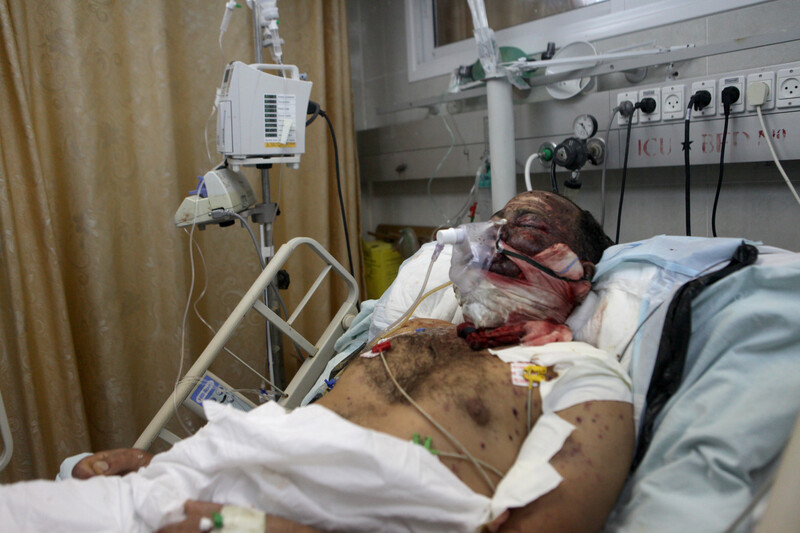The Electronic Intifada Gaza Strip 5 December 2012

Hassan Doghmosh suffers severe burns after his Gaza City neighborhood was bombed last month.
ActiveStillsSevere burns cover the face and neck of Hassan Doghmosh. Israel’s latest attack on Gaza may have ended but Doghmosh is still suffering its effects.
Doghmosh, 40, was injured when his home in the Sabra neighborhood of Gaza City was bombed during Israel’s eight-day offensive. With Gaza’s medical facilities overstretched, he was initially treated in Egypt. He is now in the intensive care unit of al-Shifa, Gaza’s largest hospital.
“There is shrapnel all over his body,” Mohammad Khail, a staff nurse in the hospital, said. “One piece of shrapnel cut an artery in his neck, causing a lot of bleeding. Also, the upper part of his left eye was hurt, causing his eyes to close completely. And he has bad wounds to his chest and abdomen.”
Six-year-old Mohammad Abu Zour lies on another bed in the intensive care unit. According to medical staff, the little boy suffered a fractured skull. His family’s home in the al-Zaytoun area of Gaza City was hit by Israeli shells three days before a ceasefire was announced.
Meanwhile, Khail explained how another patient, five-year-old Nesma Qalaja, suffered a wound to her heart that has prevented her blood from flowing normally. She and Mohammad are among the 450 children to have been injured during the eight days of attacks. More than 30 other children were killed.
According to the Gaza health ministry, Operation Pillar of Cloud — as Israel called its offensive — killed 183 persons. The UN Office for the Coordination of Humanitarian Affairs stated in a situation report today that 103 Palestinian civilians were killed. Almost 1,400 Palestinians were injured, including 155 elderly persons and 220 women, the health ministry says.
Abnormal symptoms
Nema al-Swairki from al-Mughraqa, a town in the central Gaza Strip, was one of those women. “I was close to a water well, when a bombing occurred.” she said. “I rushed to my daughter to try to protect her, then I had fainted. When I woke up, I found myself at the hospital.”
Al-Swairki, who is in her thirties, was hit in the back. She has a deep and large wound near her kidney.
Among those receiving treatment in Nasser hospital in Khan Younis is a man who was hit by an Israeli drone that struck a farm owned by his family in southern Gaza. A friend of his was killed in the attack. “I was hit directly in my abdomen and two legs,” said the man, who is in his thirties and asked not to be named.
Baker al-Derdy, the head nurse in Nasser hospital, said that when this man was first admitted, there was “a strange smell, almost chemical” from him. Al-Derdy pointed to other indications that Israel may have used chemical weapons during its offensive.
“Some of the symptoms we have seen are abnormal,” al-Derdy added. “The type of burns that appear on the bodies suggest that the weapons employed were not conventional. The burns go deep into the skin and the skin itself turns blue. And I can tell you that the burns hit even the third layer of the skin.”
Israel is known to have used white phosphorous — a highly combustible substance — during Operation Cast Lead, its three week attack on Gaza in late 2008 and early 2009. In January 2009, Amnesty International investigators reported finding white phosphorous wedges on residential buildings in Gaza City. Once it comes in contact with human skin, white phosphorous can burn deeply into the muscle and bone (“Israel used white phosphorous in Gaza civilian areas,” 19 January 2009).
Burnt-out bodies
Ashraf al-Qedra, a spokesperson for the health ministry in Gaza, said that it was not possible to confirm that chemical weapons were used by Israel last month. But al-Qedra also acknowledged that some of the burns witnessed were deeper than those associated with conventional weapons.
“We in Gaza and health bodies in the West Bank do not have laboratories where we could properly examine what types of weapons have been used in Israeli attacks,” al-Qedra said. “But according to what we have seen so far, it appears that Israel used some explosive weapons or ammunition that caused burns and deep wounds. In most cases of those killed, we have seen that bodies were either torn apart or completely burnt out. Also, many of those injured have had their lower or upper limbs amputated.”
Approximately 50 of those injured in the latest attack remain in a critical condition. Staff at al-Shifa say they do not have all the equipment needed to treat the injured. As a result, some of them have been transferred to Egyptian hospitals for follow-up care.
Both local and international human rights groups are continuing to gather information on the types of injuries inflicted. Samir Zaqout, chief researcher for the Gaza-based Al Mezan Center for Human Rights, said: “We cannot either deny or confirm Israel’s use of illicit or unconventional weapons or ammunition against the people of Gaza during the last Israeli attack.
“However, during Operation Cast Lead, international experts came to the territory and investigated. According to these experts, remnants of Israeli weapons, like tank shells and missile shrapnel, contained some very dangerous and poisonous substances. The experts advised us to bury or keep those remnants away from populated areas. These substances cause severe health complications in the long term.”
Rami Almeghari is a journalist and university lecturer based in the Gaza Strip.





